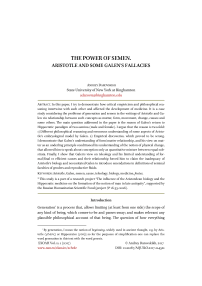The power of semen: Aristotle and some Galen’s fallacies
Автор: Darovskikh Andrey
Журнал: Schole. Философское антиковедение и классическая традиция @classics-nsu-schole
Статья в выпуске: 1 т.11, 2017 года.
Бесплатный доступ
In this paper, I try to demonstrate how critical empiricism and philosophical reasoning intertwine with each other and affected the development of medicine. It is a case study considering the problems of generation and semen in the writings of Aristotle and Galen via relationship between such concepts as matter, form, movement, change, causes and some others. The main question addressed in the paper is the reason of Galen’s return to Hippocratic paradigm of two-semina (male and female). I argue that the reason is two-fold: 1) Different philosophical reasoning and erroneous understanding of some aspects of Aristotle’s embryological model by Galen. 2) Empirical discoveries, which proved to be wrong. I demonstrate that Galen’s understanding of form/matter relationship, and his view on matter as an underling principle conditioned his understanding of the notion of physical change, that allowed him to speak about conception only as quantitative mixture between equal substrata. Finally, I show that Galen’s view on teleology and his limited understanding of formal/final vs efficient causes and their relationship forced him to claim the inadequacy of Aristotle’s biology and necessitated Galen to introduce emendations in definitions of seminal faculties of genders and reproductive fluids.
Aristotle, galen, semen, cause, teleology, biology, medicine, foetus
Короткий адрес: https://sciup.org/147103507
IDR: 147103507
Список литературы The power of semen: Aristotle and some Galen’s fallacies
- Boylan, M. (1984) "The Galenic and Hippocratic Challenges to Aristotle’s Conception Theory," Journal of the History of Biology 17, 1, 83-112.
- Henry, D. (2005) "Embryological Models in Ancient Philosophy," Phronesis 50.1, 1-42
- Horowitz, Maryanne C. (1976) "Aristotle and Women," Journal of the History of Biology 19, 186-213.
- Lesky, E. (1950) Die Zeugungus-und Vererbungslehre der Antike und ihre Nachwirkung.
- Mainz. Matthen, M. (2007) "The four causes in Aristotle’s Embryology," Apeiron 22, 159-179.
- Morsink, J. (1979) "Was Aristotle’s Biology Sexist?" Journal of the History of Biology 12, 83-112.
- Needham, J. (1959) A History of Embryology. New York.
- Preus, A. (1977) "Galen’s Criticism of Aristotle’s Conception Theory," Journal of the History of Biology 10.1, 65-85.
- Wilberding, J. (2008) "Porphyry and Plotinus on the Seed," Phronesis 53, 406-32.


